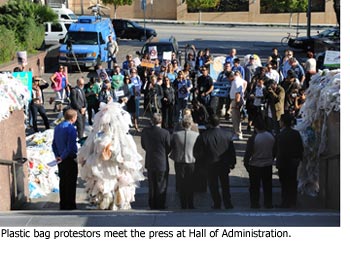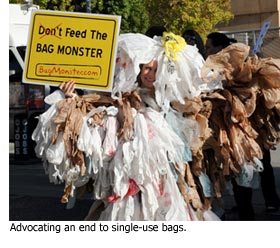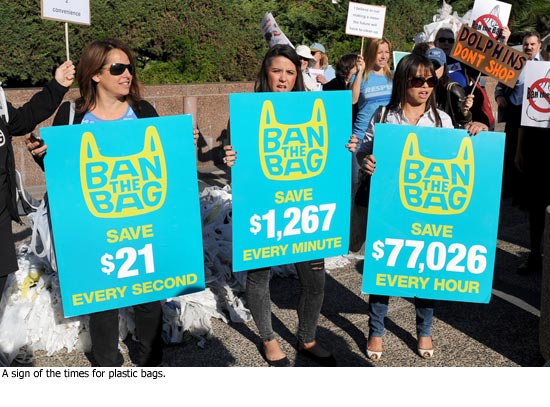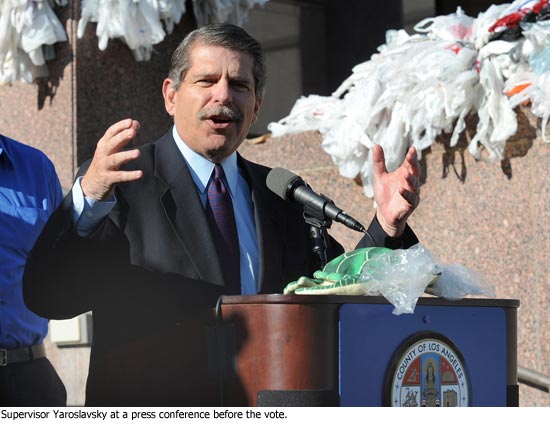Finally, it’s in the (reusable) bag
November 16, 2010
Hoping to create a domino effect across the region, the Los Angeles County Board of Supervisors on Tuesday voted to ban plastic grocery bags, long considered an environmental menace and aesthetic blight.
The ordinance, which would take full effect next July, would outlaw the ubiquitous single-use bags only in stores in the county’s unincorporated areas, home to 1.1 million people. But the board majority made clear that the larger goal is to get the county’s 88 separate cities to adopt the same law.
Ultimately, the board hopes that the movement’s momentum will carry to Sacramento, where a nearly identical measure was recently defeated in the state senate after industry opponents to the ban spent more than $2 million on lobbying in the weeks before the highly-anticipated vote. Supervisors argued that a statewide measure would bring conformity to a potential patchwork of municipal laws that could confuse customers and businesses alike.
“When we pass an ordinance of this type, the rest of the state has to take notice,” said Supervisor Zev Yaroslavsky, a leading proponent of the ban, who called the bags “urban tumbleweeds.”
Should a groundswell not materialize, Yaroslavsky said, “we can do a lot here because we are 10 ½ million people….Even if nobody else does a single solitary thing, we can make a difference.”
Added Board Chairman Gloria Molina: “This is a major undertaking for L.A. County and I’m proud. The wave is beginning here…”
 The measure was approved by a 3-1 vote. Supervisors Yaroslavsky, Molina and Mark Ridley-Thomas supported the ban, while Supervisor Michael D. Antonovich voted against it. Supervisor Don Knabe was not present.
The measure was approved by a 3-1 vote. Supervisors Yaroslavsky, Molina and Mark Ridley-Thomas supported the ban, while Supervisor Michael D. Antonovich voted against it. Supervisor Don Knabe was not present.
In Los Angeles County alone, more than 6 billion plastic bags are used each year, with only about 5% of them being recycled. Although the bags may feel flimsy, they are molecularly almost indestructible, surviving hundreds of years without degrading. Meanwhile, they litter the streets, clog landfills and flow into the ocean, endangering marine life and the commerce of the coastline.
The board’s action, which comes after several years of failed voluntary efforts, is certain to be welcomed by the growing numbers of environmentally conscious shoppers who’ve already started toting reusable bags to the market or who’ve been opting for paper, which is biodegradable. But a good number of consumers no doubt will not immediately embrace the mandated changes in their shopping habits.
The new county law not only bans single-use plastic bags, it also specifies what sort of bags can be provided in their place. Stores would have the option of giving their customers either paper bags—for which they must charge 10-cents apiece—or reusable bags. The intent of the 10-cent charge is to push consumers towards the reusable bags, the most environmentally-friendly option.
On Tuesday, the board approved an amending motion that broadened the ordinance’s definition of what constitutes a “reusable bag.” As originally written, the law would have required that the bags meet various tests for strength and durability, and that they be machine-washable. Under the amended version, the bags also could be made of materials that can be wiped clean or disinfected by hand. These standards are designed to prevent retailers from offering consumers new kinds of plastic bags that are also bad for the environment.
The board approved a second amendment specifically stating that reusable bags must comply with state and federal restrictions on permissible levels of lead and other metals, including cadmium. That 11th-hour addition came in the wake of recent reports that some reusable bags have contained high-levels of lead, leading U.S. Sen. Charles Schumer (D-N.Y.) this week to ask federal regulators to investigate the issue.
The board also directed that plastic carryout bags be phased out by next July at all county-operated facilities and offices.
In anticipation of the widely publicized vote, the board’s usually quiet meeting room was filled on Tuesday with boisterous supporters and opponents of the measure. The same lobbying organization that helped undo the Sacramento legislation—the American Chemistry Council—had recently shifted its forces to the battle of the bags in L.A., advancing the argument that the ban would kill small manufacturing businesses and leave hundreds of employees without jobs.
That theme was sounded by numerous speakers who briefly testified before the board, including one elderly woman who complained that there was “a lot of focus on plastic bags instead of people.”
Yaroslavsky said he was sympathetic to those concerns but noted that the continued fouling of the ocean could jeopardize the coastal economy and potentially lead to significant job losses.
“So at the end of the day,” he said, “we do what we think is right. And what’s right is to be part of the solution, not part of the pollution.”
Posted 11/16/10














 405 bridge work causes a stink
405 bridge work causes a stink
